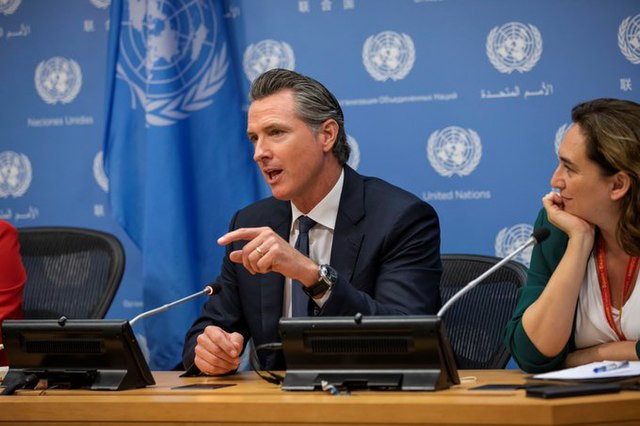California Governor Gavin Newsom is moving to position the state as an independent economic actor in response to President Donald Trump's sweeping tariff plan, telling foreign governments that California is "here and ready to talk" and signaling a willingness to engage in direct trade outreach despite constitutional constraints.
In a video message posted to X on Friday, Newsom said he had directed his administration "to look at new opportunities to expand trade" and to "remind our trading partners around the globe that California remains a stable partner." The move follows Trump's Wednesday announcement of a 10% baseline tariff on all imports, escalating to as high as 54% for goods from countries with large trade surpluses with the U.S.
"We make up 14% of the U.S. GDP. We're the 5th largest economy in the world," Newsom wrote. "We're not scared to use our market power to fight back against the largest tax hike of our lifetime."
The White House quickly dismissed the remarks. "Gavin Newsom should focus on out-of-control homelessness, crime, regulations, and unaffordability in California instead of trying his hand at international dealmaking," said spokesperson Kush Desai.
Newsom's comments come amid growing alarm among California industries likely to be hardest hit by retaliatory tariffs, particularly the state's $5 billion almond industry, which relies heavily on exports to China, India, and the European Union. A Newsom administration official told Fox News that retaliation could cost the sector billions.
California imports most of its consumer goods from Asia. Under the new Trump tariffs, imports from China will be taxed at 34%, the European Union at 20%, South Korea at 25%, Japan at 24%, and Taiwan at 32%. While Mexico and Canada were exempted from the latest round, prior 25% tariffs remain in effect.
Newsom's office also expressed concern that the tariffs could disrupt supply chains critical to California's rebuilding efforts, particularly in wildfire-hit areas. U.S. tariffs on Canadian lumber, already at 14%, could rise to 27% this year. Construction materials, electrical components, and industrial equipment needed for post-disaster infrastructure could become harder to source or more expensive, officials warned.
Trade officials cited the potential for pricing shocks in regions such as Baja California, where goods regularly cross the border for manufacturing and assembly. "Taxing goods each time they cross the border will raise final product prices and impact Californians directly," one official said.
Though states cannot unilaterally enter trade agreements or impose tariffs under the U.S. Constitution, Newsom's comments appear aimed at leveraging California's market scale to persuade foreign governments to exclude state-origin goods from retaliatory measures. California accounts for more than $675 billion in two-way trade, making it the nation's largest importer and second-largest exporter.
China was the first to retaliate Friday with a 34% tariff on all U.S. goods. Other countries, including the EU and Japan, are reportedly considering countermeasures. Markets have reacted sharply to the developments. Thursday marked Wall Street's worst session since the early days of the COVID-19 pandemic.






